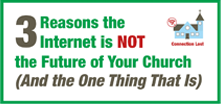
Reach Your Community
For many churches, we know we’re supposed to reach and evangelize our communities, but the people… they’re so…. Different! It feels like we have nothing in common with them. While evangelizing in today’s very sensitive and contentious society can be intimidating, we can’t let that stop us from obeying God. I mean, if they come to one of our services, sure there’s something we can talk about, but out in the world… where do we even start?
Points to remember:
1) Lead with God’s love. God so loved the world, not just His people, that He sent His Son to die for them. If God can look at the world and both say that it is good, and sacrifice His Son for its people, then we have the opportunity and responsibility to love people in and for their differences, not in spite of them. Once we start seeing all people, even the challenging folks, through the lens of God’s tremendous love, these next steps start to naturally flow.
2) You don’t have to be like someone to like and love them. We all have a grouchy neighbor or a family member on the opposite side of the political spectrum, and there can be some tension in those relationships because their outlook on life is different than ours. However, this is where the opportunity is ripe to showcase that the power of Jesus’ love is compelling. If we can show kindness consistently to the grouchy neighbor, or engage in mature and loving (but still truthful) discourse with the family member whose views are opposite ours, what does that tell them about the God we serve? Remember that Jesus hung out with tax collectors, prostitutes, and social outcasts. We are called to engage with them as well! There is tremendous freedom in knowing someone doesn’t have to be like you in order to spend time with them, and there are exciting opportunities to lead those folks to freedom in Jesus over time.
3) Culture isn’t your enemy. There is often a combative relationship between the church and culture. That’s not always the fault of the church (though sometimes it is.) Regardless of fault, we can choose to find ways to love our culture, partnering with people who aren’t like us on issues we mutually agree on (human trafficking, poverty, caring for the environment, improving education, etc.) Find those commonalities and use it as a launching point for serving together and improving the lives of the people who live in our communities. I met a woman recently who does love Jesus, but also has some views that seem to align with our culture and not with the Bible. I’ll be honest, I had been afraid to engage even this other Jesus follower in deeper conversations! Our culture yells and screams about those issues, and that’s not the kind of encounter I choose to engage in. When I followed God’s prompting to pay her a visit last week, I walked in cautious and prayerful. While we didn’t get specifically into those issues, God really blessed our time together, and has opened the doors to have those discussions in the future in a very respectful way, where we both are seeking understanding. I’ve learned so much from her about loving radically like Jesus, and God has allowed me to speak encouragement and other types of truth into her life that have been powerful. It’s so easy to stay comfortable in our “Christian bubble” with little diversity between us, but our willingness to get outside our four walls is a way to start planting seeds with the people who see our works and will be curious about the God who inspires them.
4) It’s hard to influence someone if we won’t let them in. It’s easier to distill the idea of “in the world but not of the world” down to a list of things (and people) not to associate with than it is to find ways to embrace people and activities without compromising our faith and convictions. It is in this tension though, that we find opportunities to love the deepest and connect the most with people who need Jesus. Is it easier to “stand above” (in our own eyes) those activities and people who represent all the “worldly” things we think we need to avoid? Sure, but Christianity has never been about living the easy life. When invite those people in who need Jesus rather than excluding them or writing them off, we have a greater opportunity to love them like He does, and influence them toward a life of following Him. It reminds me of the old saying “They won’t care how much you know until they know how much you care.”
5) Our job is to simply obey. This work of reaching and evangelizing our communities is a marathon, not a sprint. Influencing hearts for Jesus can sometimes be a slow process, building relationships over time baby step by baby step. We so often don’t see how the Holy Spirit is working in others’ hearts or how God is working other circumstances in their lives. It’s easy to feel discouraged when we don’t see the fruit of our efforts right away. When those feelings inevitably come, it’s important to remember that our job is to simply obey God, and to take the steps He has directed for us. After all, He is Almighty God!! We can trust Him with the ultimate outcome.
What ways have you found to reach the people in your community who are socially the least like you? Please share with us by commenting below.





